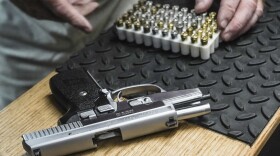The suspect in this year’s murder of three young people in a Chapel Hill apartment is scheduled for his second court appearance today.
Craig Stephen Hicks, 46, has been charged in the fatal shooting of three young people in the apartment next to his in the Finley Forest neighborhood of Chapel Hill. According to search warrants, authorities found three airsoft guns and 11 firearms in his home, including pistols shotguns and one AR-15 assault rifle with a fully-loaded magazine.
Hicks’ ownership reflects a national documented by some criminologists of some firearm owners accumulating large stashes of firearms.
But it’s difficult to find owners of multiple firearms who are willing to talk publicly about them. Firearms lobbyists, gun show organizers and gun store clerks explain: gun owners are private about what they own because they don’t want to make it easier—for thieves or for the government—to find their guns. So finding someone who owns many guns and is willing to talk to a reporter can seem almost like sighting big foot.
“Big Foot is not an adequate description of me,” says firearms collector John Landreth. He adds with a laugh: “Maybe 'Big Mouth.'”
Landreth, who lives in Chapel Hill, was so young when his father started teaching him to hunt that he had to pull the trigger with his middle finger, he says. Today, his favorite firearm is an Ithaca 20-gauge double-barrel shotgun. He remembers one day in which he used it to shoot three grouse with two shots.
“A covey of grouse flew up. I shot twice, hit three birds,” he remembers. “It was purely by accident.”
Landreth owns about 30 guns: Some for hunting, some for target shooting, some are investments. He also owns multiple guns for self defense. Why? Landreth gives the example of a UNC professor who was robbed and killed on the street during lunch time last summer.
"If he had had a revolver, or a pistol with him, he might have not needed to fire it, just to show it to his potential assailants,” Landreth says. “He might've scared them off."
Landreth says he got most of his guns before the 2000s. But he saw friends and acquaintances get worried when President Obama was elected.
"That spurred several people to start buying what they thought would be future banned firearms," he says.
In fact, starting in 2005, firearm sales sky-rocketed, says Duke University Professor Phil Cook, who studies gun violence.
Several studies show that the percentage of American households with guns is declining. It's about 32 percent. Cook says that means gun owners are accumulating more.
"There were a lot of scare stories put out about how the Democrats taking the White House, and before that Congress, that they were going to make it difficult to buy guns, so that gun lovers should go out and buy theirs while they still could or they were still legally available,” Cook says.
But several studies show that the percentage of American households with guns is declining. It’s about 32 percent. Cook says that means gun owners are accumulating more.
"Where they used to have perhaps three or four guns, now they have five or six guns, or they used to have 10 guns, now they have 20, so the concentration of gun ownership is increasing," Cook says.
Gun advocates dispute those studies. Based on anecdotes, they say that there are a lot of new gun owners.
"The fact is, I have seen hundreds of people who said they are buying firearms for the first time,” says Paul Valone, who runs the volunteer gun advocacy group Grassroots North Carolina. “Either because concealed carry laws now allow them to protect themselves in places where they previously could not, or because quite frankly, they feel it's the last time they might be able to buy a firearm."
Valone says membership in his group has more than doubled in the last four years. But definitive numbers on who owns how many firearms aren't readily available—not even for the person who issues gun purchase permits.
In Orange County, Sheriff Charles Blackwood, whose office processes applications for purchase permits and for concealed carry permits, says he can only say with certainty that there are more firearms in his jurisdiction than there were 10 or 15 years ago.
"I can recall in 1980 not hearing a shots fired call except in neighboring jurisdictions,” Blackwood says. “We didn't have it. We didn't deal with it. It wasn't something that concerned people. We have shots-fired calls now every day."
Blackwood says he has no problem with law-abiding citizens owning guns. While Craig Stephen Hicks owned his guns legally, Landreth, the firearms owner in Chapel Hill, says he doesn’t want that to reflect on gun owners as a whole, including those who own many weapons.
“He was a malcontent,” Landreth says. “He had several ways to cause problems, and that’s the one he chose.”
Hicks faces one weapons charge—discharging a firearm into an occupied dwelling—in addition to three counts of first degree murder. Prosecutors say they will seek the death penalty.






